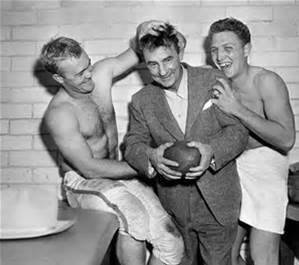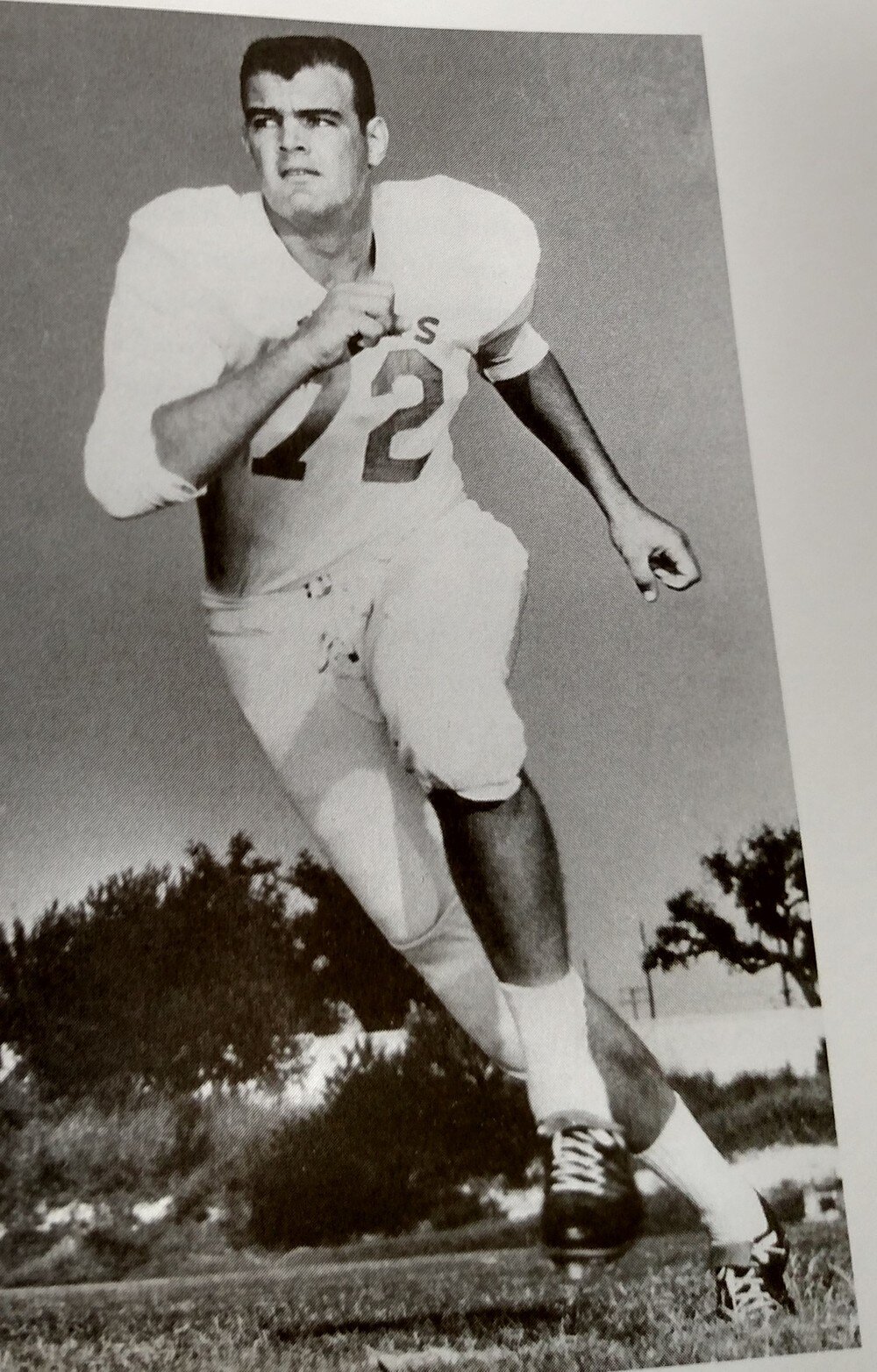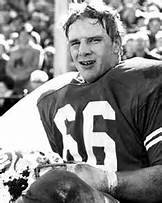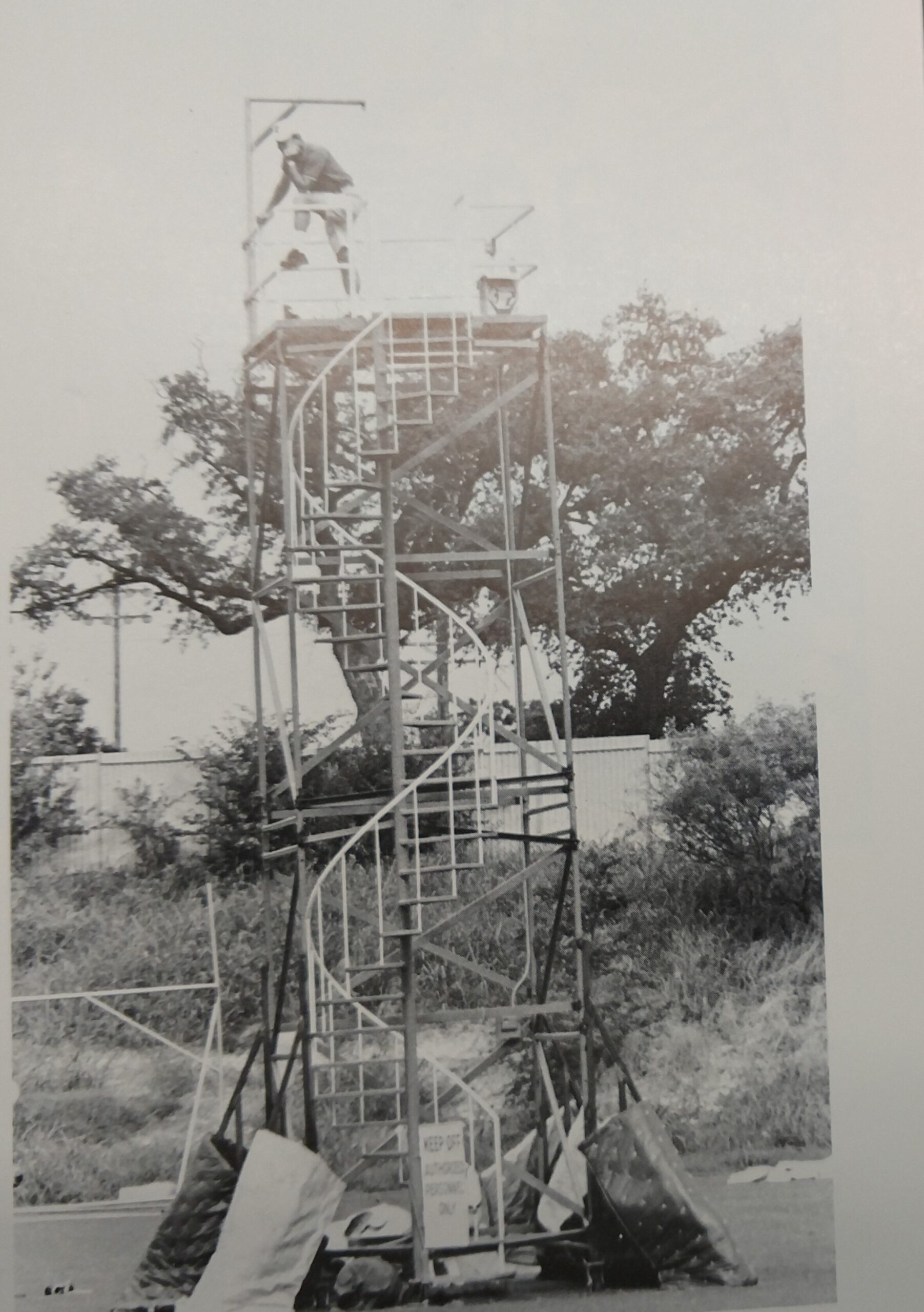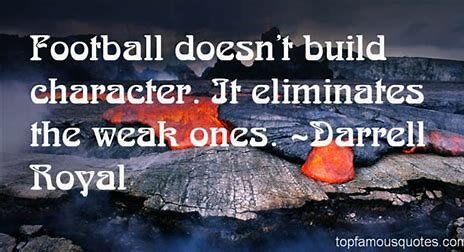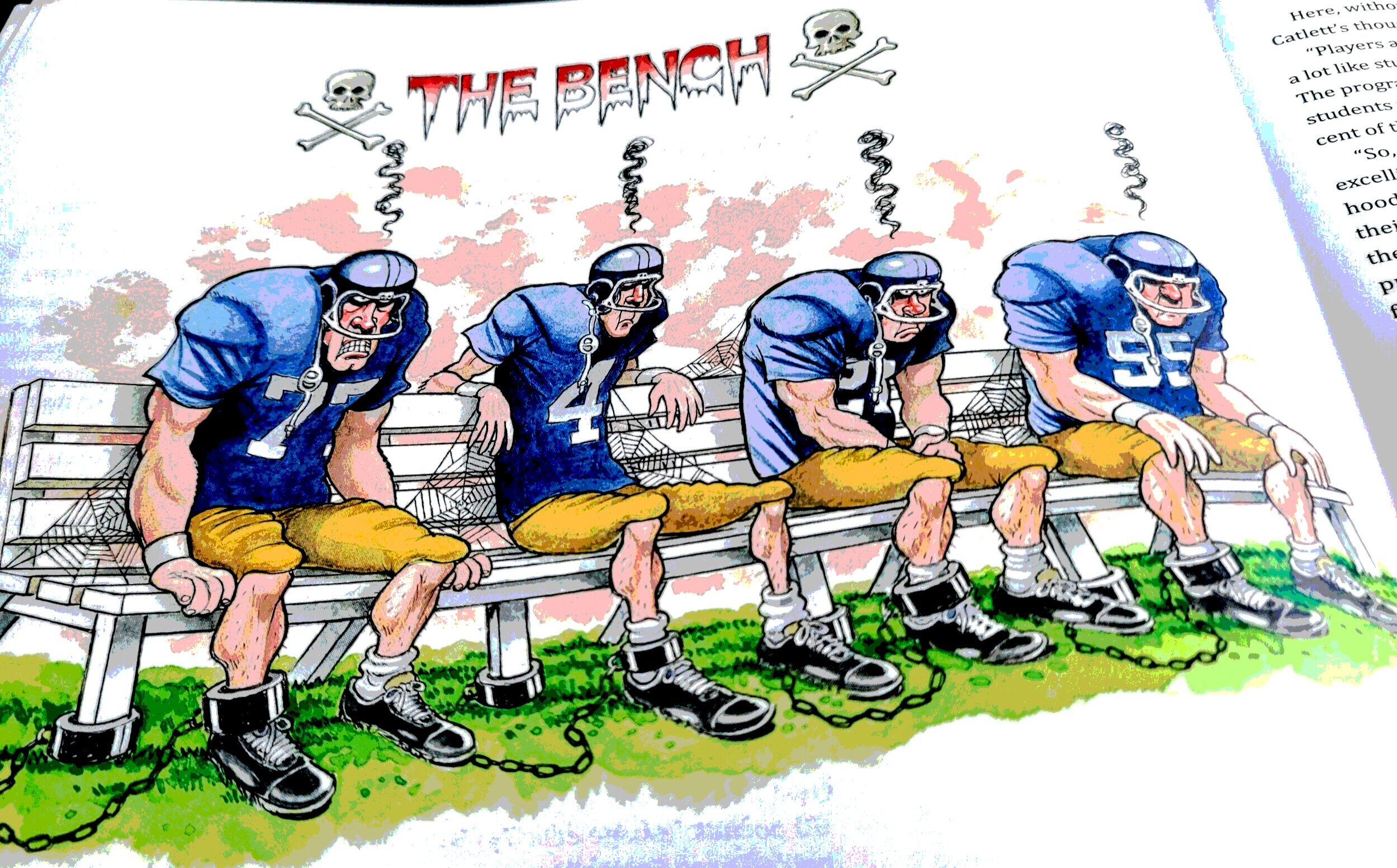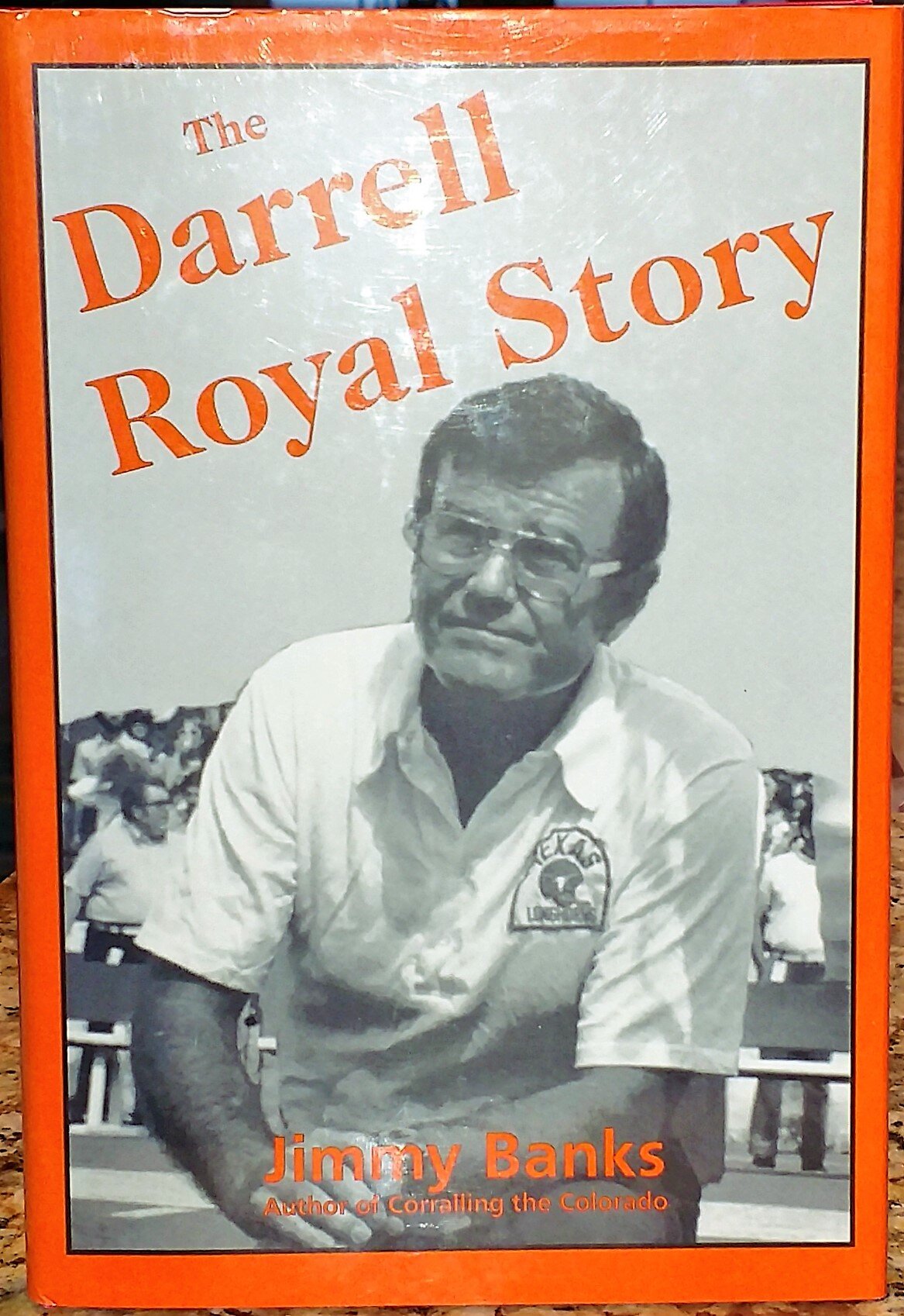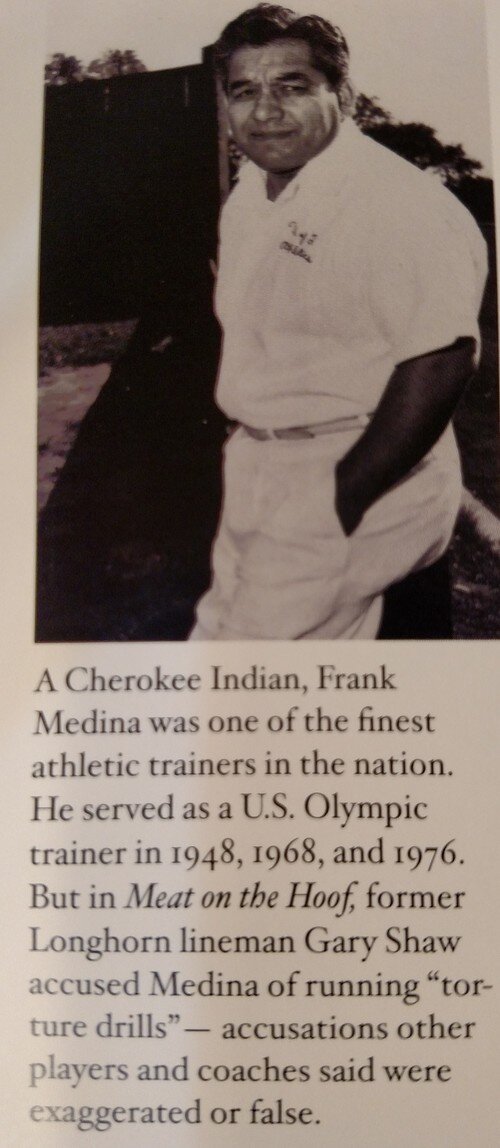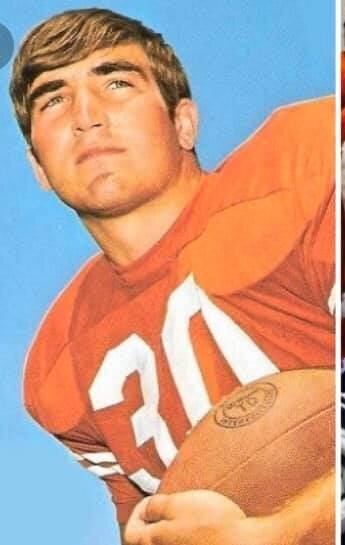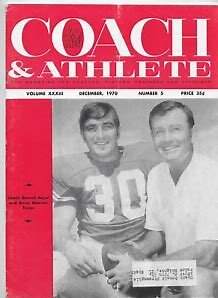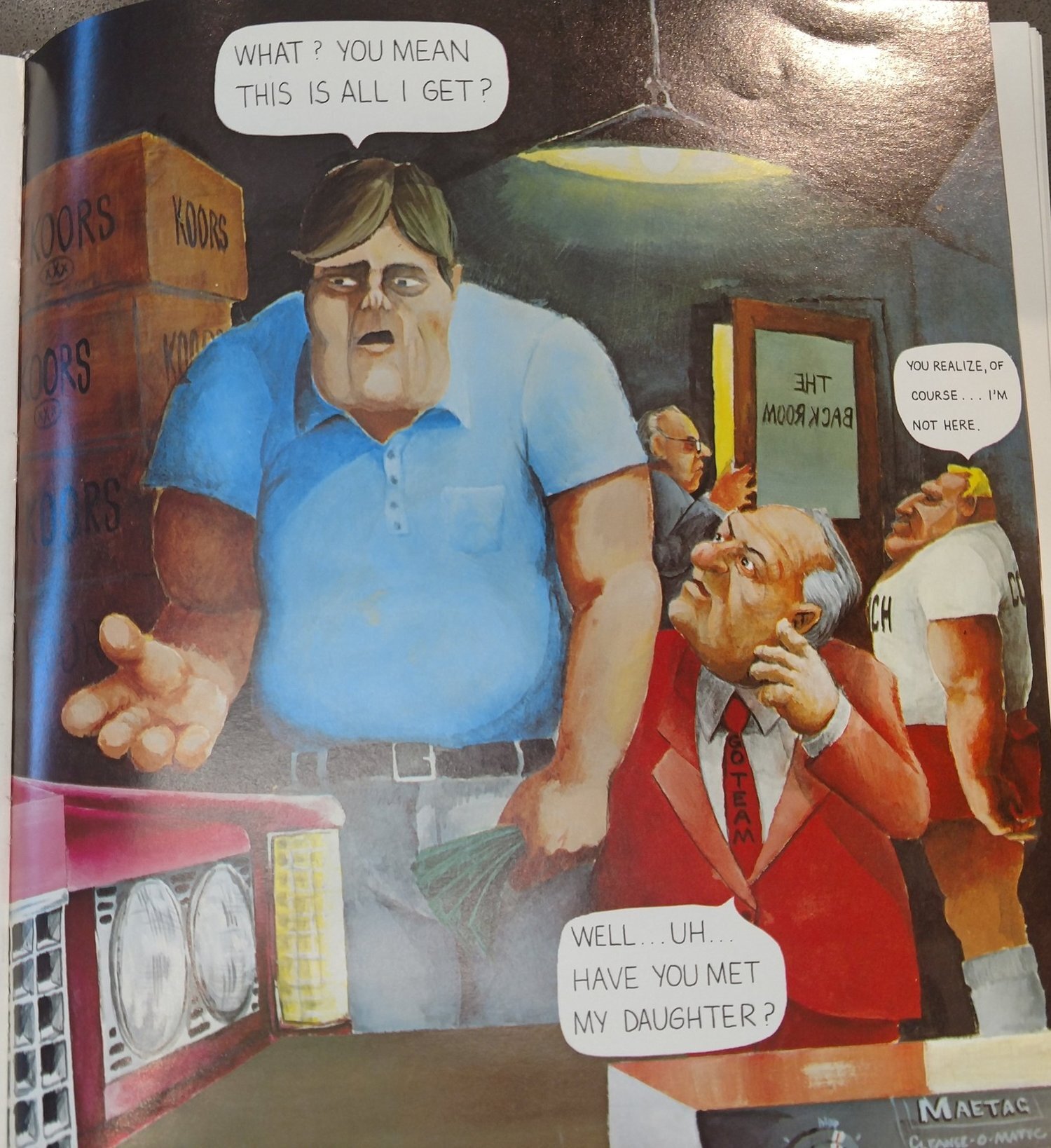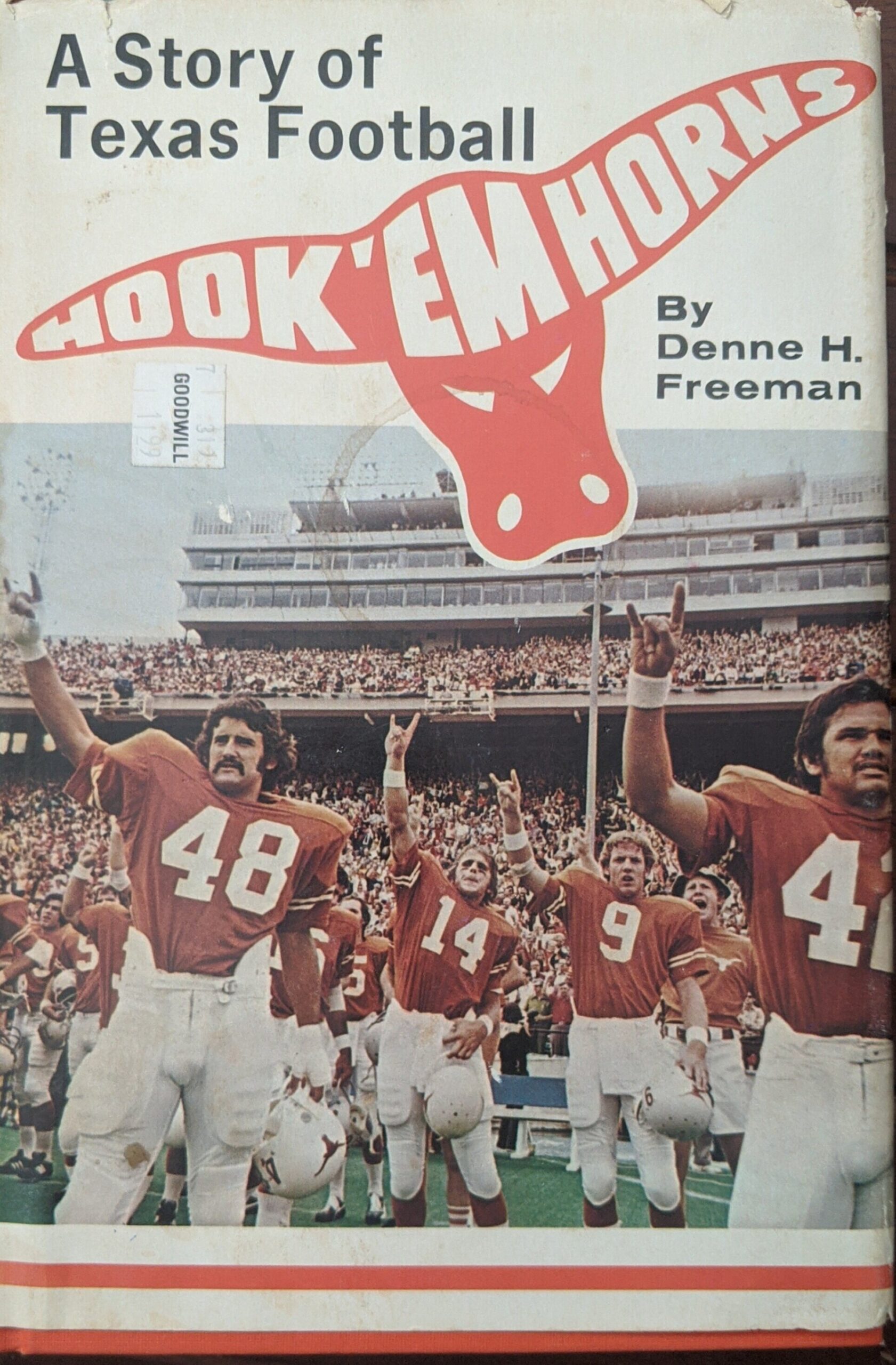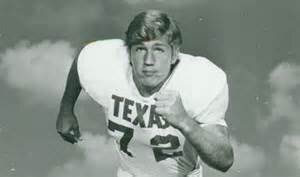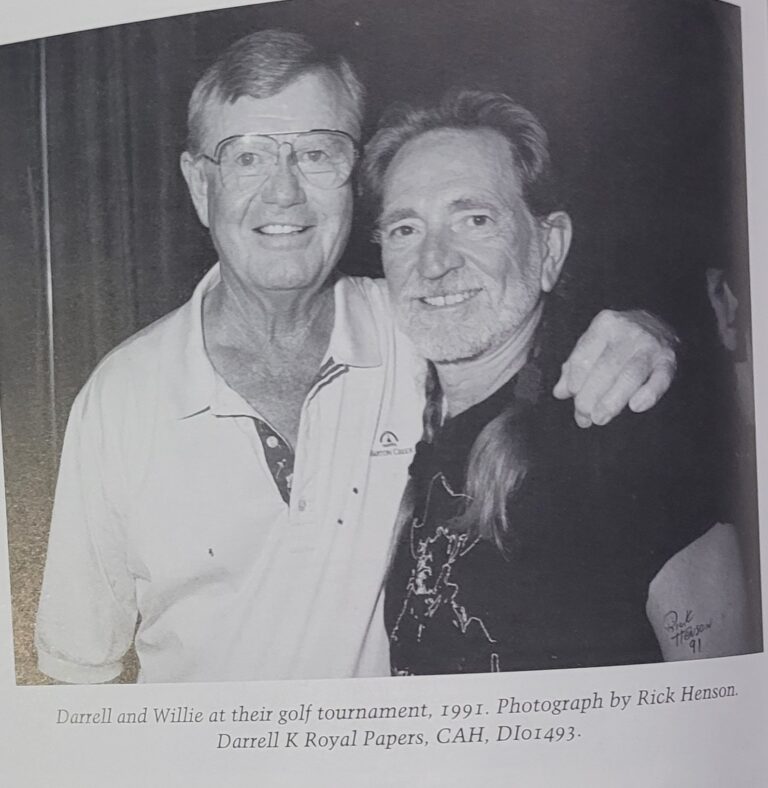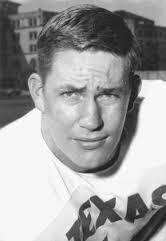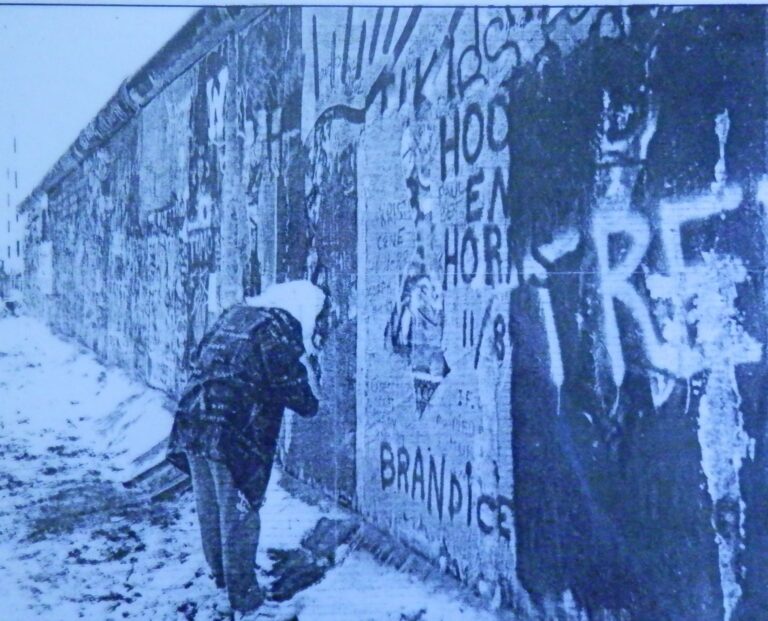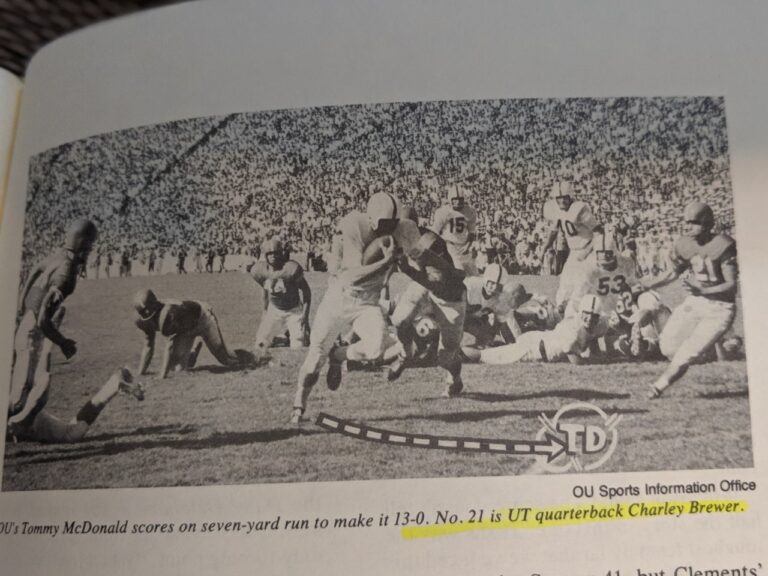In the 1960’s nice Coaches Finished Last
IN THE 1960S, NICE COACHES FINISHED LAST
“When you show up at the University, you’re all grunts. Nobody’s a superstar in Coach Royals program.” Jerry Sisemore
Only those not part of the Texas football program thought that most DKR players liked him. Royal was a simple man with a big heart for all but his players. With players, he was far more complex and distant. No matter how great, all players for Royal felt a mixture of fear, respect, hatred, anger, confusion, and reverence for their head coach.
In the ’60s, many coaches who had empathy for the players ended their careers terminated or reassigned. Those coaches learned that attachment to players made objective decision-making for the team more difficult.
One year before Coach Price recorded the worse record in the history of Longhorn football,this photo was taken in the locker room. As a former player for DKR I can assure you that no one who played for Royal would dare rub Royal’s head. NO ONE!
In the 1960s, players did not question authority. You did what you were told or suffered the consequences. There was no democracy in football, or “listening” to the player’s concerns. If’ concerns. Others would gladly take your position if you did not do as instructed. Players were welcome to leave the program at any time.
Don Talbert – 1959-1961 says, “In those days, they had, like, 125 scholarships, and whoever quit, left, or got runoff could be replaced with another player. “As a player in the pros, Don said many guys said, “Hey, man, I sure would have liked to have played for ol’ Darrell. “Don responded, “You might have wished you’d played for him, but your ass would have had to get in high gear to do that.”
Starter Mike Dean from the 1969 team said, “If he never said your name the entire time you were (at Texas), you would be very happy.” “I don’t know anybody who was not scared to death of Royal.” Mike says, “he once told me if I were down on you all the time, you would quit the team. If all I did were praise you, you’d let up.” “You never knew where you stood with him.” “One day, he would praise you, and the next day, he’d make you feel like a piece of dirt.” “Because of this, we all feared him, and honestly, we didn’t really like him.” However, now after my playing years are over “I now love the man but at the time (playing for him) I just knew if he said my name it wasn’t going to be good.”
Linebacker Scott Henderson, a junior in 1969, said, “Some people thought he was ruthless, and some people thought he was unfair, but I always found him to be tough but fair.” Randy Peschel said, “Royal was a psychologist and motivator second to none. He knew what buttons to push to get you to do what you needed to do. I know my appreciation grew for him exponentially after I was through playing college football.”
It was not a good sign when Royal came down the tower during practice. Once his feet touched the ground, the players held their collective breath, waiting to see if he turned North to the offensive practice field or South to the defensive practice field. All knew that someone was in trouble, and during these moments, players and assistant coaches found religion praying for redemption from Royals’ wrath.
James Street said “you could feel him in the room and you’d get quiet. Daddy Dee’s (Royal) here some where. I just don’t know where. We were kind of afraid of him.”
Bob Kay said about Royal “I didn’t even want him to know my name. I was in his office five times in 4 years. Only once was it pleasant.
THE TURD BOWL
From Royal’s first year at Texas from 1957 to 1966, there were no limits on the number of scholarships. Randy Bishop, a player for the Horns in the 60s, said, “I think Texas signed guys, just so they didn’t have to play against them.” Logistically, the number of players was unmanageable If all the players remained. Royal and the coaching staff devised a Darwinian process to eliminate players and resolve that issue. Exhausting physical workouts and scathing reviews of players meant to destroy spirit were the coaching tools of choice. For many, sitting on the bench was unthinkable. Slowly dying on the bench while watching teammates out there on the field doing what every player wants to was considered death by desertion. Players became disillusioned and quit.
Bobby Gurwitz remembers a discipline issue that jeopardized his position on the team. Bobby says, “They sent me to be cannon fodder for the varsity, and I spent most of the season there. Every drill they could put you through that wasn’t fun; I was involved with it. It was just survival, but it taught me a lot about playing the game; it taught me a lot about being tougher than I was, and it taught me to stick to it.”
As a player, I was appalled by this screening process. I was afraid that one of the coaches might have a bad day at the office and take it out on me. If that happened, my dream of playing for the Longhorns would be in serious trouble. Players understood that once tagged as “questionable talent,” they would enter a DKR gravitational black hole from which neither light nor players could escape.
After the roster was determined and the season started, those in the black hole had to prove they deserved to be on the team continually. Royal reasoned that If these players wanted to remain, they would have to continue to improve and contribute to team play.
On Mondays, upper-class men who did not play in the Saturday game scrimmaged the freshman in what was appropriately named the Turd Bowl. Most everyone who participated dreaded this game. Many felt that Royal’s turd bowl was just another attempt to run them off and an implicit punishment for their low status on the team. Tom Campbell says, “There were all-staters who thought they were above that, so they just lost their hearts.”
While I never participated in a turd bowl, there were benefits to the scrimmage. Tom Campbell was one of the “shit drill turd bowlers” who viewed these scrimmages as an opportunity to improve his skills. He regarded the event as “instructional,” a time to improve fundamentals and techniques. Coach Campbell did not consider the turd bowl punishment. He was looking for talent to fill the pipeline. Tom persevered, and his place in Longhorn’s sports history is well chronicled.
In fairness, not all Longhorns quit because of the tough regimen. There were good athletes that wanted to play Division I football and realized that their position as number 7 on a depth chart was not indicative of their heart and talent. These players chose to move on with spirit and self-esteem intact with the goal of fulfilling their dreams in another venue.
There were others who for many and various reasons were not mature enough to adjust to a myriad of first-time distractions. And finally, many on the team who had great work ethics were just not good enough.
A Royal fall-out from “Meat on the Hoof” by Gary Shaw
While Gary Shaw’s book Meat on the Hoof is full of exaggerations and half-truths, the book was a best seller. Longhorn National Champion and New York Jets Super Bowl Champion George Sauer endorsed the book. This is another story that TLSN has captured for posterity @
https://www.texaslsn.org/george-sauer-conflicted-soul
Royal responded to allegations in Gary Shaw’s on why players rebelled against him and his coaching style in the book “The Darrell Royal Story” by Jimmy Banks.
Royal said, “Any time you have somebody sitting on the bench you’ve got a potential family of enemies. Every year there are potentially a “100 enemies” sitting on the bench.
Royal continues:
-
“A guy would have to be a stone idiot to love going out there and just running into someone else. What is natural about two guys backing off and running into each other? It’s not natural.” The players play this unnatural sport because they want “recognition…as individuals, but also for their team, their school, or their hometown.” Players want letter jackets because it is a form of recognition.
-
“I often tell parents. If you send me a good one. I’ll send you a good one back. But if you send me a weak one, I’ll probably return a weak one. I don’t take credit for the strong character of our championship teams; the mommas and daddies deserve that credit. But neither do I want to be blamed for some player who comes in here lighter than a June frost and can’t stand the competition (Gary Shaw)”
-
“All the glory can’t be heaped just on the team. The personal, individual aspect has to come in there.”
A comment from football fan Lance Brown
Billy Dale, since I was not there, I cannot agree or disagree with u, Shaw, or any of the others. Because it was a best-seller, it doesn’t mean that many people agree with it, either. It’s like reading “Ball Four”…a controversial book about MLB at the time. Many denounced Bouiton—but I remember asking one player about how much was true, and he said: “About 99%. It all depends on your POV. Many books are written about famous people—what is fact vs. fiction is hard to know. But it’s good to hear different viewpoints, both pros and cons.
Lance Brown continues
football was very different 60 years ago. Coaches were rougher on players. Bear Bryant’s practices at A&M in Junction were legendary. More like seal training. Once upon a time, water breaks were NOT scheduled, and coaches belittled those who needed water. But training was different. The coaches weren’t as well educated about the human body’s needs for hydration. Of course, with NIL and transfer portholes, coaches have a delicate balancing act. Before, they had scholarship players by the shorthairs. Now, if Arch Manning doesn’t get a lot of playing time this season—-he’s history. And Ewers can appear in commercials for a whiplash lawyer. The world of college football has changed dramatically from when you played Billy Dale. Whether that’s good or bad depends on your POV. But I understand why Saben decided to cash in.
Gary Shaw did not like Frank Medina either.
In 1972, Gary Shaw, a former Texas football player, wrote a book called Meat on the Hoof, which mentions the “Medina Sessions.” The author says that “cattle are treated better than the football players.” Most of the comments in his book are vindictive, exaggerated, and untrue. I know because I trained under Frank Medina. However, even after discounting Gary’s exaggerations, hitting a punching bag until I could no longer raise my arms was still painful.
Medina treated conditioning as a biblical trial to measured the fight of players. “Marginal” players felt like their workouts were more rigorous than the conditioning drills for the starters. Starter Bobby Mitchel said that many felt that Medina was the henchman used to run off players.
Mike Dean did not believe that Frank’s ultimate goal was to run off players. For all teams in all sports, conditioning is part of the process to prepare for game day. Experiencing pain is also part of the conditioning process.
Frank’s job was to get the players in shape for the season. Mike says, “we were in incredible shape, and Frank deserves some credit for our success.”
For more about Frank visit
https://www.texaslsn.org/frank-medina-1
The Recruiting of Steve Worster
After the football players’ fulfilled their commitment to Texas, Royal morphed into a caring, compassionate, and gentle person who made all his former players feel special.
Bobby Gurwitz (1958-1960) understood that “if you went all the way for Coach Royal, he would go 110 percent for you. If you didn’t, …. he wouldn’t have anything to do with you.” Gurwitz remembers players “who did things the right way, if they needed an extra six months or a year of college to get their degree, whatever he (Royal ) had to do, he’d help them get their degrees.”
Steve Worster is an excellent example of the Royal 110 percent rule. Royal acted as an advocate for a player and fulfilling a promise he had made to Steve in 1967.
According to Terry Frei, the author of Horns, Hogs, and Nixon Coming, LSU and Texas A & M boosters offered Steve money, clothes, gas, and other “necessities ” for a signed letter of intent. One Coach from a different conference just came out and asked Steve to write on a piece of paper what he needed to attend college at ……, Steve said that offer “insulted me.”
Steve refused the request, but that Coach persisted and wrote on a piece of paper “apartment, money, new car, and a tailor.” Steve refused all bribes and ended his recruiting journey after a conversation with DKR.
Coach Royal said to Steve:
“ Look, I know what you are going through. I know that you’re getting a lot of things thrown at you. Let me tell you something if we bought people, believe me; you’d be the first person we bought. But we don’t buy people. We’ve offered you a phenomenal scholarship, a great education at a wonderful university. You come here, and I promise I’ll do everything in my ability to see you graduate.”
A great testimonial to a great Coach who fulfilled his promise to one of his players.
Royal was true to his word. Steve did not graduate from Texas in the 4 years allotted. Instead, Woo chose to pursue a professional football career. Years later, after Steve failed as a professional football player and made some other critical errors in his life, Steve called Coach Royal and asked for help. Royal used his influence to help Steve start a new path. Steve returned to school received his degree and with the help of Royal found a job he liked.
Royal despised the Recruiting process
SpyGate, cheating, losses to OU, pandering to recruits, articles that suggested he was a racist, and his first non-winning season all sapped Royal of his passion for the game. Coach Royal conceded that winning did not excite him anymore, and he found it challenging to recover mentally from losses. He also said, “Climbing is a thrill. Maintaining is a Bitch.”
Of the factors mentioned above, the evolution of recruiting process disgusted him the most.
Royal wondered why 1,000’s of high school kids every year managed to choose a college without an emotional breakdown while high school football recruits and their families entered a state of neurosis choosing the “right” school?
When Royal started recruiting for Texas in 1957 the high school kids were respectful of authority, thoughtful, and polite. A recruiter was an authority figure and many young athletes were afraid it would hurt the recruiter’s feelings if he said no.
Royal told anyone who would listen that high school athletes should focus on a few (not many) Universities during the recruiting process. He encouraged recruits to say no to a recruiter on the first contact if he was truly not interested in attending that university. The longer a high school athlete says “maybe” to a recruiter, the harder it is to say no later.
Royal thought it was inherently wrong to court athletes to give them a college education. He said, “it’s all backward; the kids should be coming to us, not us going to them.” Royals’ advice was ignored by both parents and recruits and by 1967 the recruiting process turned ugly.
In reflection, Royal said that both young high school athletes, their parents, and the universities who recruited them made critical mistakes. Royal says “The parents and recruits who initially were looking forward to the courting of their sons by the major collegiate football powers go from welcoming coaches with open harms to closing doors on them.” Royal also said, “we know we abuse the prospect and the family during recruiting, but it’s a two-way street. The families and the prospects abuse us.”
Steve Ross says, “One of the reasons coach Royal decided to “set his bucket down” at such an early age was the changing recruiting landscape. Steve tells the story of Royal’s last recruiting year. DKR is at the home of a highly recruited player who has not returned from practice. Royal is sitting with the mom in the living room when the recruit shows up. The first thing he says to the coach is, “You’re sitting in my chair man.” “Coach said he jumped right up. And on the way back to Austin, seriously began to consider getting out.”
Abe Lemmons knows why Royal retired “You build a monster, and the monster eats you.” It got to the point for Royal that even winning had long-term disadvantages.
Royal also confides in the book “A Story of Texas Football Hook’em Horns” by Denne H. Freeman that being successful in recruiting has disadvantages . When The Longhorns were riding high in the 60s and had back-to-back national championships, and the Horns had defeated Oklahoma six times in a row it got so only ones who were pulling for Texas were true Orangebloods.
Royal says, “that’s just the nature of man we pull for underdogs.” “I pull for underdogs! I like to see somebody else share a little of that wealth.” The old saying that “even your best friends don’t like to see you too successful is true. Everybody likes to see a little wind taken out of your sails.”
Recruiters from other universities bribed, exaggerated, and lied about Royal and Texas to get the attention of potential recruits. Comments like “Royal is a racist,” “playing at Texas you are just a number,” “the school is too liberal with students that mainline drugs”, and “you will never start at Texas,” all were desperate ploys that on the surface appeared credible to 17-year-old recruits.
Mike Hatchett (1979-1981) says that in 1976 he was aware of rumors and allegations concerning the University and concerning Coach Royal, that he was a racist and didn’t want to or could not coach African American athletes. In Royal’s case, a lie told enough times becomes the truth hurt and hurt his ability to recruit.
Chris Gilbert confirms these points in the book What it Means to be a Longhorn. In the end, Royal chose to retire with the quote “You can’t win against cheaters.” Chris said the Royal offered him nothing but a chance to play and a great education. “All anyone can do is to provide you with the opportunity to succeed. “ “I came to the conclusion that Coach Royal was one of the most honest coaches I had ever met.” Glen Blackwood concurs “They (the Longhorn coaches) taught the game with integrity and they weren’t looking for ways to bend the rules. They taught me to play the game with character.”
Mike Baab -1978-1981- said ‘“the only schools that didn’t offer me suitcases of money were The University of Texas and Rice.” “One Coach stacked hundreds in front of me. “well, money’s nice, but that’s not how I’m going to pick my school.”
In the book “Darrell Royal Dance With Who Brung Ya” Doug English says about Royal’s resignation “Suddenly, Darrell looks up and a game that he’s worked his whole life-a game of who works the hardest and prepares the best wins- has become a game where the ones who cheat the best, the ones who spy the best, who lie the best are all gaining ground.” Royal was “not going to listen to an 18-year-old kid tell him that that he’s got to buy him a new pickup truck to come to the University of Texas”.
